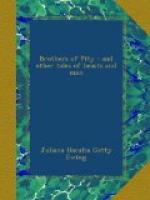“In they trooped, and set themselves to work to turn it into a strong castle, well fortified against all danger. They stopped up the holes and cracks with tufts of grass, and piled a wall of big and little stones right round the house. When the repairs were completed they called it Hencastle.
“During the autumn some of the fowls ventured forth into the cornfields that lay near the haunts of men, and collected a store of grain to supply them with food during the winter. They kept it on the floor of a loft, and when spring came they sowed the remainder of the stock in a field, where it produced such an abundant crop that they had plenty of provisions for the following winter.
“Thus they lived a peaceful and happy life, which was so uneventful that it has no history; and Mark, the watchman, who always stood on the coping-stone of the highest chimney to act as sentinel, used constantly to fall asleep, partly from sheer boredom, and partly from the combined effects of old age, good living, and having nothing on earth to do. Flaps, too, who had undertaken to guard the castle against intruders, and who at first used to patrol the house carefully inside and out every night, soon came to the conclusion that the game was not worth the candle.
“One chilly evening, about the time of the first snows, when the wind was beginning to whistle over the heath and make strange noises in the castle, two old hens were up in the loft having a chat and picking up a few stray grains of corn for supper. All of a sudden they heard a mysterious ‘Piep.’ ‘Hollo!’ said one, ’what’s that? no one can be hatching out at this time of the year—it’s impossible; yet surely something said “Piep” down there in the corner.’
“Just then another ‘Piep’ was heard.
“‘I don’t think it sounds quite like a young chicken,’ replied the other hen.
“In the middle of their discussion on this knotty point, they descried a couple of mice at the edge of the corn-heap. One of them was sitting on his hind-legs, washing his ears and whiskers with his fore-paws, but his wife was gobbling up corn at a rapid rate, and in this sight the wise and far-seeing old hens discerned the probability of future troubles.
“‘Hollo there! that’s our corn,’ they cried; ’you mustn’t steal it. Of course you may have a few grains in the depth of winter to keep you from starving; but remember, when spring comes again, this sort of thing must stop, and you must go away and never come here any more.’
“‘Piep,’ said the mice, and vanished.
“The two hens told the rest what had happened, but nobody troubled themselves about such an insignificant matter, and some said that the poor old things made mountains out of molehills. Anyhow, in two days everybody, including the wise hens themselves, had forgotten all about it. Later on, that winter, the mice had seven young ones—seven such skinny, thread-limbed, beady-eyed little beasts that no one noticed their arrival.




